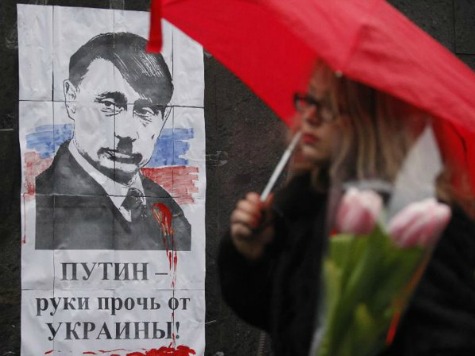
On September 1, 1939, Nazi Germany attacked Poland–beginning a series of attacks and invasions that would result in the fall of Poland and the start of World War II.
Adolf Hitler wanted to conquer Poland because of territorial relationships with Germany prior to the end of World War I, when the Treaty of Versailles cut German territory and expanded it in Poland. This gave Poland control of “the ‘corridor’ which divided East Prussia and the German-speaking Free City of Danzig from the Reich heartland.”
Similarly, Russian President Vladimir Putin’s current posture toward Ukraine, and particularly south-east Ukraine, is an outgrowth Ukraine’s relationship with the former Soviet Union. Those former ties are highlighted by pro-Russian forces in south-east Ukraine, and Reuters reports that the tension between the Ukrainian government and the pro-Russian forces is inviting Russian intervention.
Hitler antagonized and pressured Poland for months before launching the September 1 attack. In much the same way, Putin is currently pressuring Ukraine. On August 31 Business Insider reported that Putin is now pressing for “the political organization of society and statehood in the south-east of Ukraine,” months after annexing the Crimean peninsula into Russia.
War is in the air in Ukraine, in much the same way that it was Poland in 1939.
In his book, The Second World War, historian John Keegan wrote, “Although the Poles had begun to mobilize in July as war became imminent, they had not fully deployed all their men by [September 1]” and simply could not withstand the force brought to bear against them.
France and Britain officially aligned with Poland prior to Hitler’s attack, issuing “a joint declaration guaranteeing the independence of Poland” on March 31, 1939. This came days after the French cabinet agreed action had to be taken against Hitler “when [he] next moved” and Britain “publicly announced” plans to fight “to the utmost of its power” if the Nazis launched “further attacks on small states.”
But Hitler banked on his instinct that France “would not move against him in the west.” He also believed Britain could not mobilize fast enough to follow through on their pronouncement.
He was right on both counts. And as History reports, Warsaw surrendered to the Nazis on September 27.
Ukraine enjoys the backing of United States, Britain, and Germany, all of which have spoken against threats of Russian aggression toward the former state of the Soviet Union.
But is Putin confident the U.S. and others will act if he takes egregious action against Ukraine? Or can he take solace as Hitler did in knowing that the talk is just that and nothing more?
The fate of Ukraine, and particularly south-east Ukraine, rests in the answers to these questions.
Follow AWR Hawkins on Twitter @AWRHawkins Reach him directly at awrhawkins@breitbart.com.

COMMENTS
Please let us know if you're having issues with commenting.